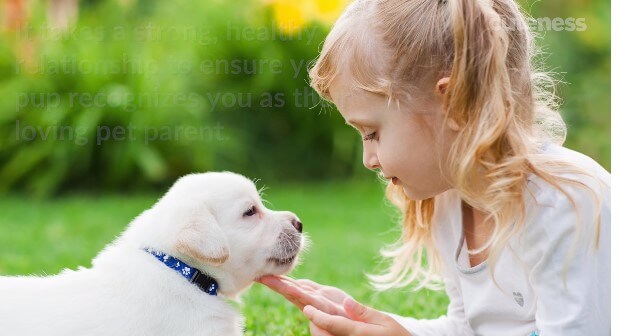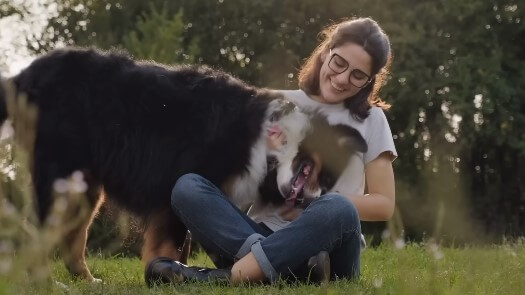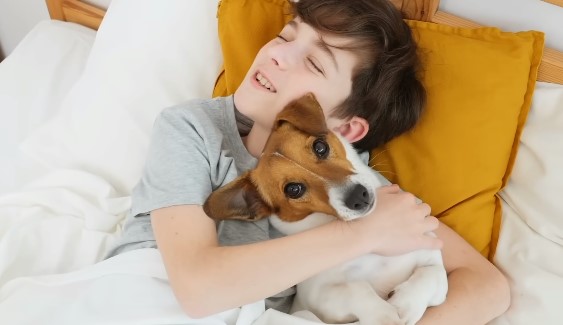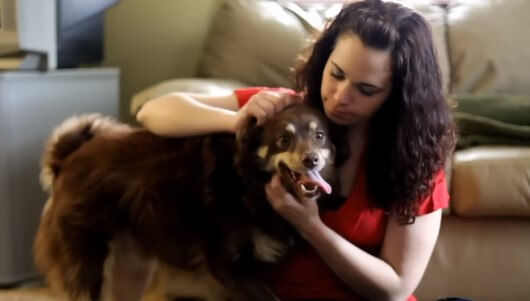Dogs are known for their unwavering loyalty and affection towards their human owners, often forming deep bonds that can be likened to parent-child relationships.
As devoted pet parents, we often wonder how our furry companions perceive us. Do they view us as just their provider of food and shelter, or is there something more to the connection?
One intriguing concept that many dog owners ponder is whether their canine friend sees them as a baby. This question stems from observing the behaviors and interactions between dogs and their human caregivers.
We will explore the fascinating dynamics of the human-dog bond and delve into the question: Does my dog think I’m her baby?
Exploring The Complex Bond Between Humans And Dogs
Dogs have been part of our lives for thousands of years, forming an extraordinary bond with humans that is both fascinating and heartwarming. This complex relationship has evolved over time, and researchers have delved into the intricacies of the human-canine connection to understand the dynamics behind it.
We will explore the various aspects of this bond, from the evolution of the human-canine relationship to the science behind how dogs perceive humans. Join us on this journey as we unravel the mysteries of the dog-human bond.
The Evolution Of The Human-canine Relationship
The incredible bond between humans and dogs can be traced back to the earliest stages of human civilization. Experts believe that dogs descended from wolves and were domesticated around 20,000 to 40,000 years ago.
This domestication process resulted in dogs acquiring certain traits that made them more suitable for human companionship, such as heightened social skills and a willingness to cooperate with humans.
Domestication Of Dogs
Before dogs became our beloved companions, they were wild animals. As humans began to settle in one place and form agricultural communities, they noticed the benefits of having dogs around.
Dogs were excellent hunters, protectors, and even helped with herding livestock. Over time, these early humans selectively bred dogs with desired traits, leading to domestication.
Dogs As Companions Throughout History

Throughout history, dogs have played a diverse range of roles in human society. From guarding property to providing emotional support, dogs have proven to be loyal and dedicated companions.
In ancient civilizations, dogs were revered for their hunting abilities and were even depicted in artwork. Over time, dogs transitioned from working animals to beloved pets, becoming cherished members of our families.
Unraveling The Canine Mind: How Dogs Perceive Humans
Dogs have a remarkable ability to understand human emotions and behave accordingly. Research suggests that dogs have evolved to read human facial expressions, vocal cues, and body language, allowing them to interpret our moods and respond with empathy and affection. Studies have shown that dogs can even distinguish between different human emotional states, such as happiness, anger, or sadness.
Dogs’ Ability To Recognize Human Emotions
Dogs are highly sensitive to human emotions and can often sense when we are feeling down or stressed. They offer comfort and support, sometimes even nudging us or curling up beside us, providing a sense of solace. Humans have a natural tendency to project parental emotions and behaviors onto dogs, leading to the belief that dogs may see us as their “babies.”
How Dogs Form Attachment With Humans
Attachment refers to the strong emotional bond that develops between individuals. Dogs form attachments with their human companions through a combination of factors, including socialization, training, and consistent positive interactions. Dogs can become deeply attached to their owners, relying on them for security, comfort, and love.
The Science Behind Bonding: Do Dogs See Humans As Babies?
While dogs may exhibit maternal or paternal behaviors towards humans, it is essential to understand that their perception of us as babies might not be entirely accurate. Research has shown that dogs perceive humans as part of their social group, rather than as their offspring. However, dogs’ ability to form social connections and provide care and protection aligns with some aspects of parental behavior.
Similarities Between Parental And Owner Attachment
There are striking similarities between the attachment dogs form with their owners and the bonds seen between parents and their children. Dogs view their owners as a source of safety, comfort, and nourishment, much like how infants rely on their parents. This shared bond highlights the deep emotional connection dogs have with their human companions.
Research On Dogs’ Perception Of Humans

Researchers have conducted numerous studies to gain insights into how dogs perceive humans. These studies involve observing dogs’ behavior, brain imaging techniques, and analyzing their responses to various stimuli.
The findings suggest that dogs rely on our voices, scent, facial expressions, and body language to understand us better, creating a strong foundation for their attachment to humans.
Factors Influencing Dog-human Relationships
Several factors shape the unique relationship between dogs and humans. Early socialization, positive reinforcement-based training, consistency, and love contribute to the strength of this bond.
Additionally, the environment in which a dog is raised, the owner’s behavior, and the level of care provided all play a role in nurturing a healthy and loving dog-human relationship.
Role Of Oxytocin In Bonding
Oxytocin, often referred to as the “bonding hormone,” is released in both humans and dogs during positive social interactions. This hormone promotes feelings of trust, affection, and attachment.
Oxytocin may play a crucial role in strengthening the bond between humans and dogs, solidifying the emotional connection that exists between them.
Socialization And Training Effects
Socialization and training from an early age are vital in shaping a dog’s behavior and their ability to form positive relationships with humans.
Proper socialization exposes dogs to various people, animals, and environments, allowing them to develop the skills necessary for healthy interactions.
Positive reinforcement-based training methods build trust, communication, and cooperation, strengthening the bond between dogs and their owners.
The Impact Of Human Behavior On Dogs’ Perceptions
Dogs are highly attuned to human behavior and emotions. How we interact with them, the tone of our voice, and our body language can all influence how dogs perceive and respond to us. Our behavior should be consistent, patient, and loving to foster a sense of trust and security within our canine companions.
Recognizing Signs Of Maternal/paternal Behavior In Dogs

Dogs may exhibit behaviors that resemble those of maternal or paternal instincts, such as grooming, protecting, or nurturing us. It’s important to recognize and appreciate these behaviors, as they indicate the depth of the bond between dogs and their human “pack members.”
Enhancing The Human-canine Bond
To promote a stronger bond with your dog, prioritize quality time together. Engage in activities that your dog enjoys, such as daily walks, playtime, or training sessions.
Provide them with mental stimulation, a balanced diet, and regular veterinary care. Offering love, affection, and positive reinforcement will nurture the bond between you and your furry companion.
Tips For Improving The Relationship
– Spend quality time with your dog every day, engaging in activities they enjoy. – Prioritize positive reinforcement-based training methods that foster trust and cooperation. – Provide mental stimulation through interactive toys and puzzles.
Establish a consistent routine and provide necessary care, such as regular exercise, grooming, and feeding. – Display affection and love towards your dog, reinforcing the emotional connection between you.
Promoting Mutual Understanding And Trust
Building a strong bond with your dog is a two-way street. By understanding their needs, providing a safe and loving environment, and communicating effectively through positive reinforcement, you can develop a relationship based on mutual understanding and trust.
The bond between humans and dogs is a rich and extraordinary partnership that has stood the test of time. Embrace this unique connection and enjoy the unconditional love and companionship your dog brings into your life.
Is it Natural Dog Thinks I’m her baby

Many dog owners wonder if their dogs think of them as their babies. The answer is not so simple, as dogs do not have the same concept of parenthood as humans do. However, dogs do show some behaviors that indicate a strong bond and attachment to their human companions, which may resemble maternal or paternal instincts in some ways.
One of the hormones that influences maternal behavior in dogs is oxytocin, which is also known as the “love hormone” or the “cuddle hormone”. Oxytocin is released when a dog interacts with its owner, especially during physical contact, such as petting, grooming, or cuddling.
Oxytocin helps the dog feel calm, relaxed, and happy, and also strengthens the emotional bond between the dog and the owner.
Another factor that affects how dogs perceive their owners is their socialization and learning history. Dogs that are raised by humans from a young age tend to see their owners as their primary social partners and sources of security, comfort, and guidance.
Dogs that are exposed to different people, animals, and situations learn to adapt and cope with various challenges and stimuli. Dogs that are isolated or abused may develop fear, anxiety, or aggression towards unfamiliar or threatening people or things.
Therefore, it is natural for dogs to form a close relationship with their owners, but it is not accurate to say that they think of them as their babies. Dogs have their own way of expressing their affection and loyalty, which may differ from human expectations or interpretations.
The best way to understand your dog’s behavior is to observe it carefully and respectfully, and to provide it with the appropriate care, training, and stimulation it needs to thrive.
Frequently Asked Questions For Does My Dog Think I’m Her Baby
Does My Dog Think I Am Her Mother?
Dogs don’t view their human owners as their mothers. However, they do form a close bond and see us as their primary caregiver.
Does My Dog Think He Is My Baby?
Dogs may see themselves as part of your family, but it’s unlikely they think of themselves as babies.
How Does Your Dog Feel When You Have A Baby?
Dogs may react differently to the arrival of a baby. Some may feel excited, curious, or protective.
It’s important to introduce them gradually to the baby, provide them with attention and reassurance, and supervise their interactions to ensure everyone’s safety and well-being.
What Does My Dog Think I Am?
Your dog sees you as its trusted companion and provider, someone who offers love, care, and protection.
Conclusion
Ultimately, it’s a beautiful thing how our furry friends perceive us. Dogs have an innate ability to form deep connections, and it’s not uncommon for them to view their owners as their babies.
From the way they look to us for love and protection, to their unwavering loyalty, dogs truly embody the meaning of unconditional love.
So the next time your dog gazes at you with those adoring eyes, know that in their heart, you are their beloved family. Cherish this bond and continue showering them with the love and care they deserve.
- Smelly House Because of Dog? Take These Hygiene Tips - May 20, 2025
- How to Introduce a Dog To a Cats Without Chaos - May 6, 2025
- 4 Best Cavapoo Rescues in the UK 2024 - April 5, 2024








